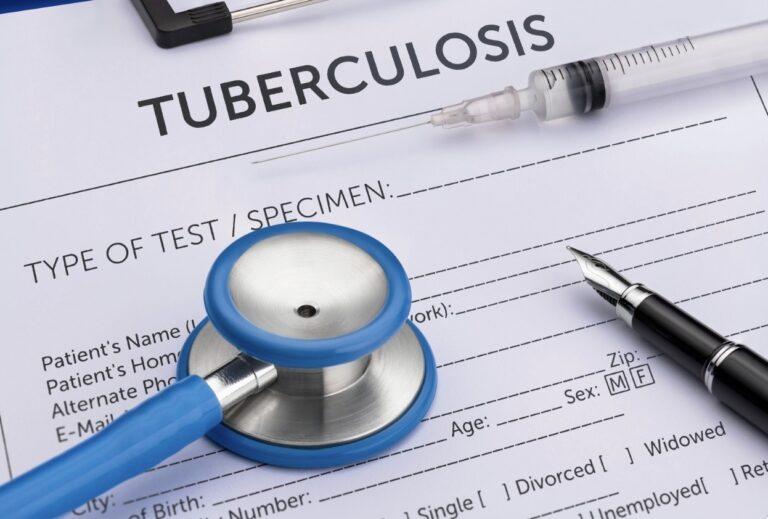The Return of Victorian Diseases

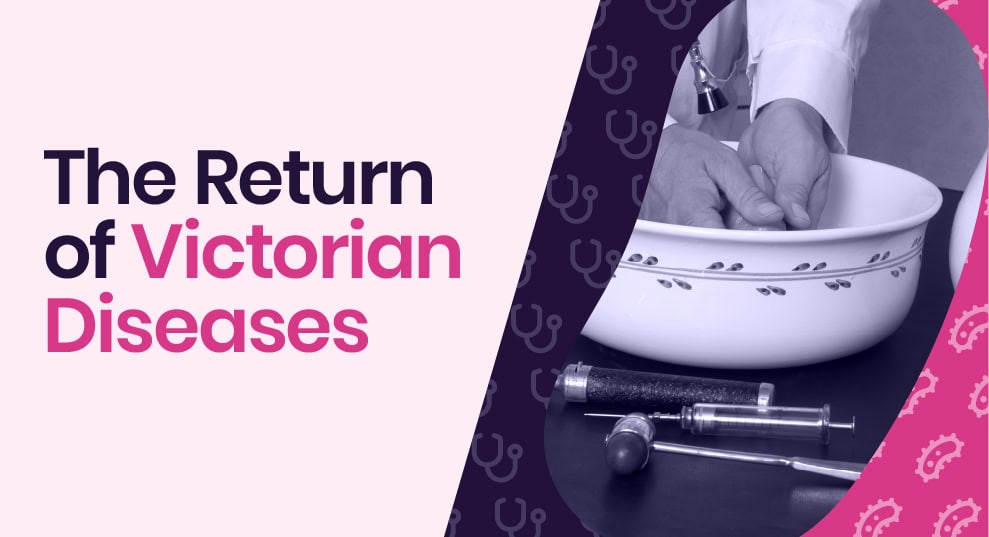
Which Victorian diseases have surged in reported cases across the UK? Unfortunately, some of the diseases we thought we were rid of are starting to return to the UK. From having an NHS pharmacy online to constant breakthroughs in medical research, treatments are now more attainable than ever. Despite this, Victorian-era illnesses still pose significant health risks.
To understand more about the current state of Victorian diseases in the UK, we have revealed the NHS trusts that have seen the most significant spikes in reported cases over the last five years. We have also delved into search data to discover which old-school illnesses the UK public is most curious about.
Liverpool University Hospitals has seen a bigger change in gout cases than any other NHS trust, increasing by more than 960%
Characterised by pain and swelling in your joints, gout is a type of inflammatory arthritis which affects one in every 100 people. The list below reveals which areas of the UK have seen the most considerable increase in gout cases over the last five years.
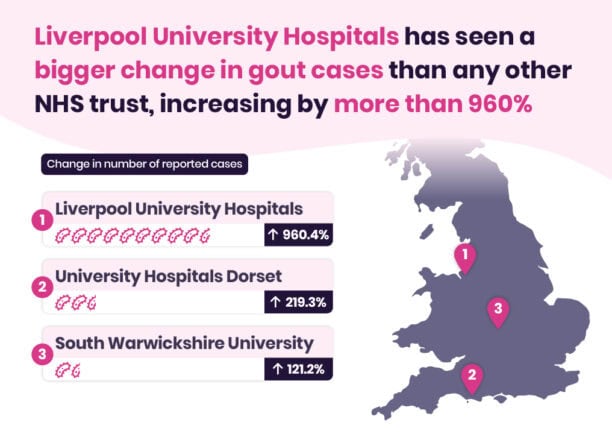
1. Liverpool University Hospitals – 960.4% increase
Taking the top spot on our list, with a 960.4% increase in gout cases in the last five years, is Liverpool University Hospitals. From just over 550 reported cases in 2019 to almost 5,900 in 2023, the number of gout cases within this Merseyside trust has risen more than any other UK area.
2. University Hospitals Dorset – 219.3% increase
University Hospitals Dorset is next on our list as we go from one end of the country to another. Located in southwest England, this county may have the fewest total number of reported cases of all the entries in our top three, but it has suffered the second-highest increase in gout cases, totalling 219.3% since 2019.
3. South Warwickshire University – 121.2% increase
With increased reported gout cases totalling more than 120% in the last five years, South Warwickshire University completes our top three. This NHS Trust has recently been granted funding to build a dedicated diagnostic facility for patients to improve treatment times for conditions like gout.
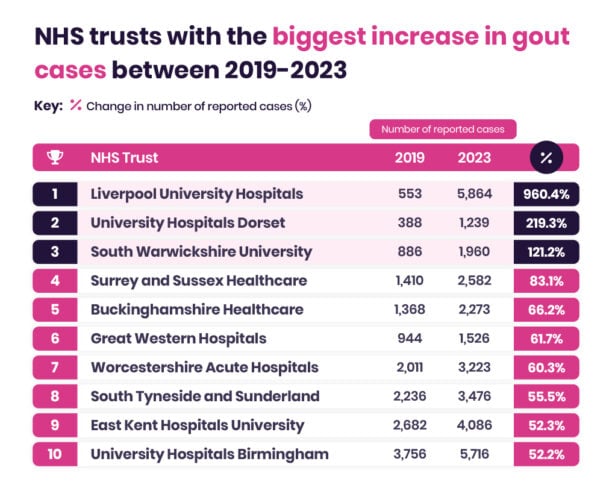
With a 380.3% increase in reported cases since 2019, East Kent Hospitals University have seen the most significant change in rickets cases
Rickets, or soft/weak bones, has been a diagnosable medical condition for centuries. While the number of rickets cases has reduced significantly over the years, this condition is still diagnosed in the UK. The list below reveals which NHS trusts have seen the most considerable change in cases of rickets since 2019.
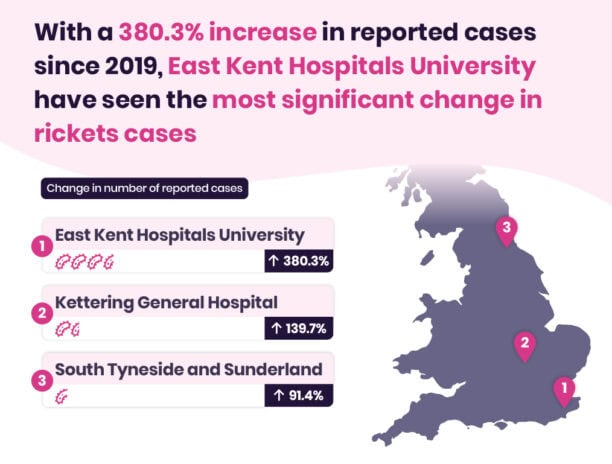
1. East Kent Hospitals University – 380.3% increase
As one of the largest hospital trusts in England, it may be a surprise that East Kent Hospitals University has the lowest number of reported cases of rickets in our top three, totalling just shy of 600 in 2023. However, when the change in reported cases is considered, this equates to an increase of 380.3%, the largest of any UK area.
2. Kettering General Hospital – 139.7% increase
Kettering General Hospital appears next on our list, with an increase in rickets cases totalling almost 140% in the last five years. Rickets can increase the risk of broken bones and dental problems, stressing NHS services.
3. South Tyneside and Sunderland – 91.4% increase
South Tyneside and Sunderland are completing our list of NHS trusts with the most considerable increase in cases of rickets. From 877 reported cases in 2019 to almost 1,700 in 2023, this equates to a 91.4% increase, the third-highest spike in cases in the UK.
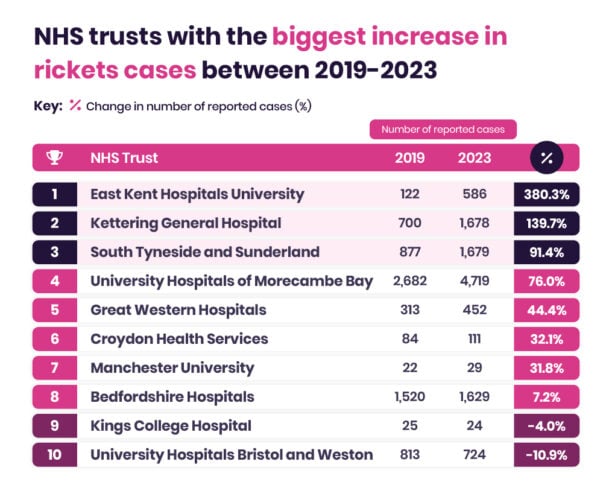
No NHS trust has seen a more significant spike in malnutrition cases than Liverpool University Hospitals, increasing by almost 447% over the last five years
A lack of nutrients in your diet can result in a diagnosis of malnutrition. Unfortunately, malnutrition is still prevalent in the UK despite the improvement in food nutrition over the years.
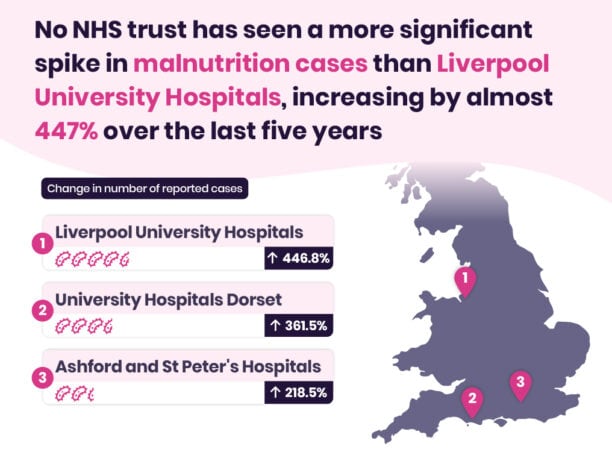
1. Liverpool University Hospitals – 446.8% increase
Liverpool University Hospitals is making another appearance on one of our rankings, this time regarding the change in malnutrition cases. Between 2019 and 2023, this area has seen a 446.8% increase in reported cases of this illness, a more considerable change than any other UK NHS trust.
2. University Hospitals Dorset – 361.5% increase
Up next on our list, with a 361.5% increase in reported cases of malnutrition, is University Hospitals Dorset. The high cost of living may have impacted resident’s access to nutrients, which could have contributed to the increase in cases of this illness over the last five years.
3. Ashford and St Peter’s Hospitals – 218.5% increase
Ashford and St Peter’s Hospitals serve patients in the Surrey area. Between 2019 and 2023, this NHS trust has seen an increase in malnutrition cases of more than 218%, which is the third highest of any trust on our list.
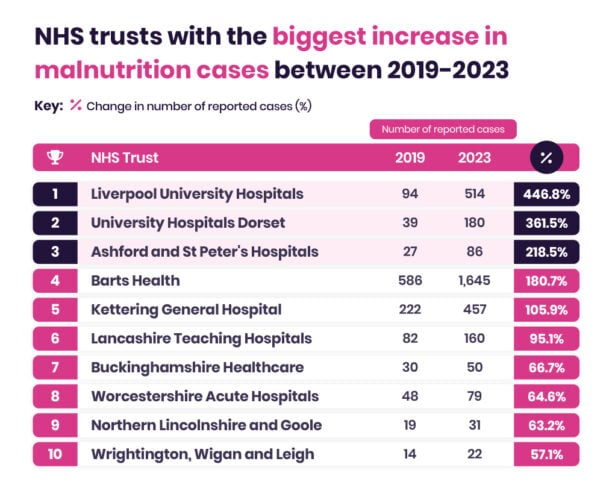
Tuberculosis cases in Kettering General Hospital have more than tripled in the last five years, a more considerable increase than any other NHS trust
Tuberculosis is an infection which usually affects the lungs, but which NHS trusts have been contracting it at the highest rates? Here’s what we found.
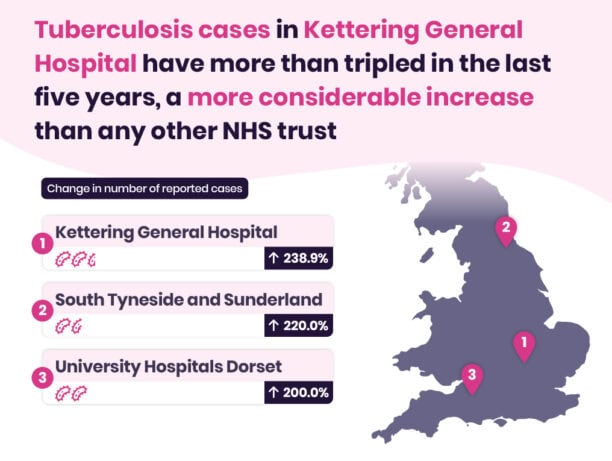
1. Kettering General Hospital – 238.9% increase
Tuberculosis cases are on the rise in Kettering General Hospital, with this NHS trust having the most significant increase in reported cases over the last five years, totalling 238.9%. As well as having the biggest increase in tuberculosis cases, this NHS trust saw the most reported cases of this disease in 2023 of all the entries in our top three.
2. South Tyneside and Sunderland – 220% increase
Covering South Tyneside, Sunderland, and some areas of Durham, this NHS trust has gone from 10 reported cases of tuberculosis in 2019 to more than 30 in 2023. While this may not be a vast number of reported cases, it equates to a 220% increase, the second-highest on our list.
3. University Hospitals Dorset – 200% increase
University Hospitals Dorset is completing this top three ranking, with an increase in tuberculosis cases of 200% over the last five years. It was recently revealed that this NHS trust is investing millions of pounds to improve its facilities and services. In turn, this will help to improve the quality of care provided to patients with infections like tuberculosis.
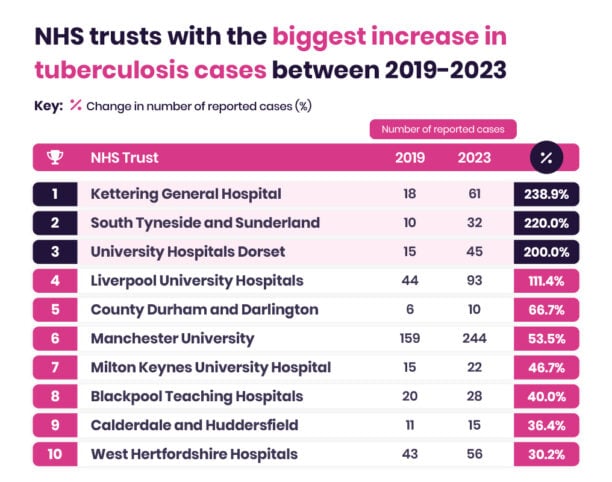
With an increase of nearly 378% in the last five years, Manchester University has seen a more substantial rise in malaria cases than any other NHS trust
Malaria cannot be contracted in the UK as it is transmitted via the bite of a mosquito, which is native to tropical regions of the world. Despite this, there are reported cases yearly due to UK holidaymakers.
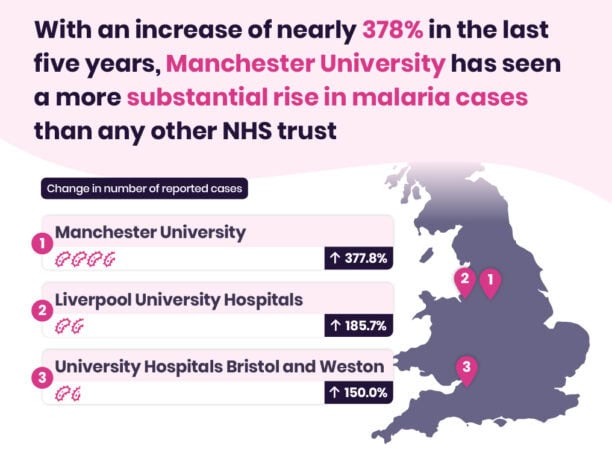
1. Manchester University – 377.8% increase
Considering that Manchester University is the largest NHS trust in the UK, it may be no surprise that they have the highest total number of reported cases in 2023. In addition to this, they have also seen the most significant spike in malaria cases since 2019, increasing by almost 378%.
2. Liverpool University Hospitals – 185.7% increase
With a 185.7% change in malaria cases, Liverpool University Hospitals appears next on our list. Even though this NHS trust only reported 20 cases of malaria in 2023, this is more than double that of 2019, the second-highest increase on our list.
3. University Hospitals Bristol and Weston – 150% increase
University Hospitals Bristol and Weston complete our top three list of NHS trusts with the most significant change in malaria cases between 2019-2023, increasing by 150%. With an overall rating of ‘outstanding’, it appears that any patients with malaria at this trust are in safe hands.
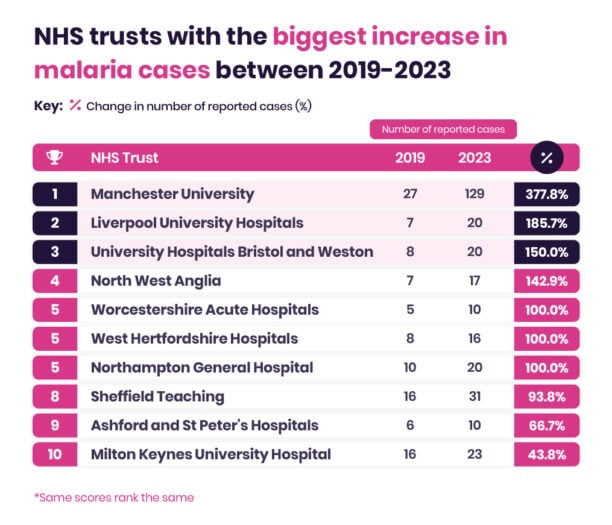
Chelsea and Westminster Hospital has seen a more considerable change in scarlet fever cases than any other NHS trust, increasing by 300% since 2019
Scarlet fever is a bacterial illness characterised by flu-like symptoms. Reported cases of this disease date back centuries, but which UK areas have recently seen the most significant rise in cases? Here’s what we found.
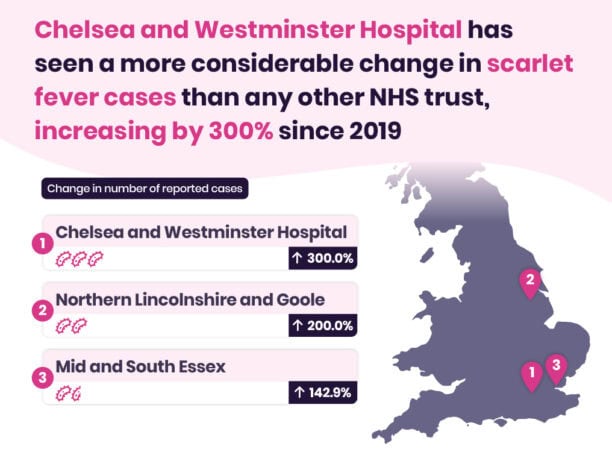
1. Chelsea and Westminster Hospital – 300% increase
With a 300% increase in reported cases of scarlet fever, the most significant change in cases belongs to Chelsea and Westminster Hospital. It’s not all doom and gloom, as antibiotics can quickly treat this infection.
2. Northern Lincolnshire and Goole – 200% increase
Next on our list are Northern Lincolnshire and Goole. Operating hospitals across North Lincolnshire, East Riding of Yorkshire and East and West Lindsey, this NHS trust reported 15 cases of scarlet fever last year compared to just five back in 2019, equating to a 200% increase.
3. Mid and South Essex – 142.9% increase
Because Mid and South Essex is one of the biggest NHS trusts in the country, it may be surprising that it has only seen 17 reported cases of scarlet fever throughout 2023. Having said this, cases here have spiked by almost 143% since 2019, the third highest of any NHS trust.
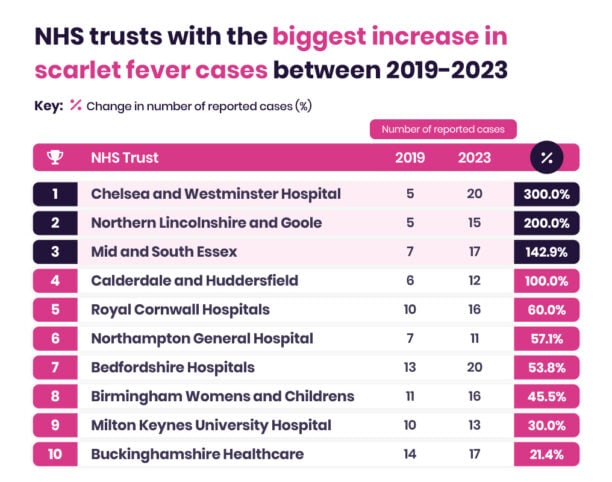
Regarding Victorian diseases, UK residents have been searching for whooping cough vaccines more than any other, with more than 200,000 searches in the last year
Fortunately, advancements in technology and science have meant that vaccines have been developed to protect us against diseases. The following list reveals which Victorian diseases UK residents have Googled the most regarding vaccinations.
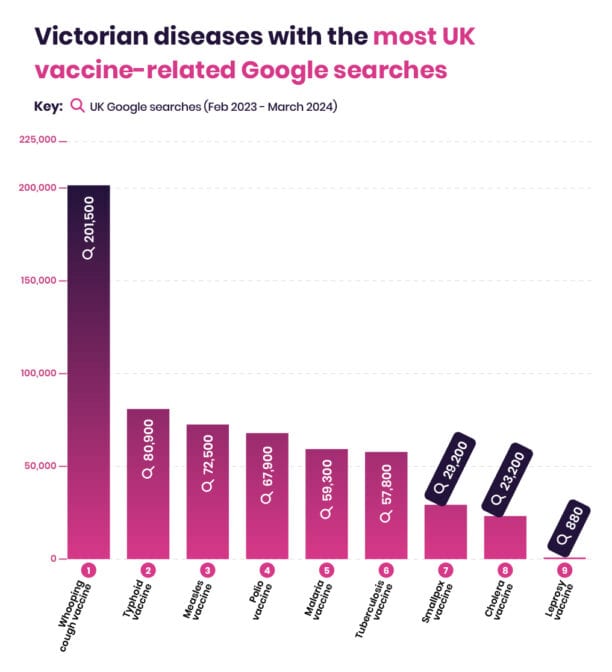
1. Whooping cough vaccine – 201,500 Google searches
Recent figures have revealed an enormous increase in cases of whooping cough since January 2024, and it seems that UK residents are keen to protect themselves against this infection, evidenced by the 201,500 UK Google searches for ‘whooping cough vaccine’ in the last twelve months.
The two most common vaccines are DTaP and Tdap, which protect you against whooping cough and diphtheria, polio, and tetanus. Young children and babies should receive DTaP, and older children and adults should have the Tdap vaccine. It is also recommended that pregnant women should get the whooping cough vaccine to help protect their unborn baby from contracting it during their first few weeks of life.
2. Typhoid vaccine – 80,900 Google searches
Typhoid is next on our list, with 80,900 Google searches in the last year. While typhoid is uncommon in the UK, residents here believe that safe is better than sorry. Regarding typhoid vaccines, there are oral and injectable options, which will protect you for up to three years and should be received a fortnight before travelling to a risk area.
3. Measles vaccine – 72,500 Google searches
The highly contagious nature of measles and its nasty symptoms make it a virus you want to be protected against. With more than 72,000 Google searches for ‘measles vaccine’ in the last year, this infection is the third-most Googled of all the Victorian diseases on our list.
Google searches for measle vaccines have spiked more than any other Victorian disease in the UK, with an increase of 825%
We have revealed the most sought-after Victorian vaccines, but which has seen the most significant rise in Google searches? Here’s what we found.
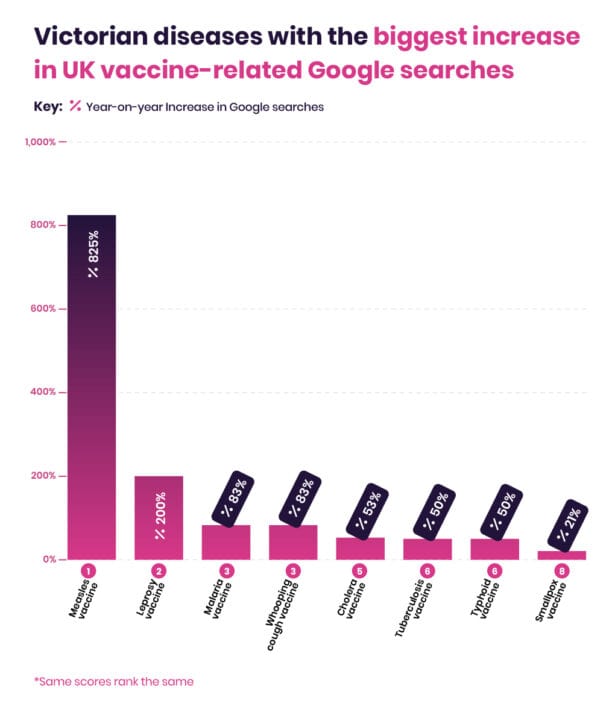
1. Measles vaccine – 825% increase
After being revealed as having one of the highest overall search volumes for ‘measles vaccine’, it may come as no surprise that this disease has seen a significant increase in Google searches, totalling 825% in the last year.
If you are looking to protect yourself against measles, the most common vaccine is the MMR, which protects against mumps and rubella as well as measles. It is recommended that all UK children receive the vaccine as it is estimated to be 96% effective against measles, and adults who didn’t receive it as a child are also eligible.
2. Leprosy vaccine – 200% increase
Even though leprosy has the lowest total number of vaccine-related Google searches on our list, this is a 200% increase in searches from the previous year, indicating that it is a topic of worry for UK residents.
3. Malaria vaccine – 83% Increase
Completing our top three, with an 83% increase in UK searches for vaccines, is malaria. As previously mentioned, the parasites which spread this disease are native to tropical regions, so taking antimalarial tablets before travelling to a risk area is extremely important for UK residents.
Gout symptoms are Googled more than any other Victorian disease in the UK, racking up over 471,000 searches in the last year
With different diseases spiking in prevalence in recent years, it is vital to get a diagnosis promptly. The following list reveals which Victorian diseases have garnered the most Google searches regarding symptoms in the last twelve months.
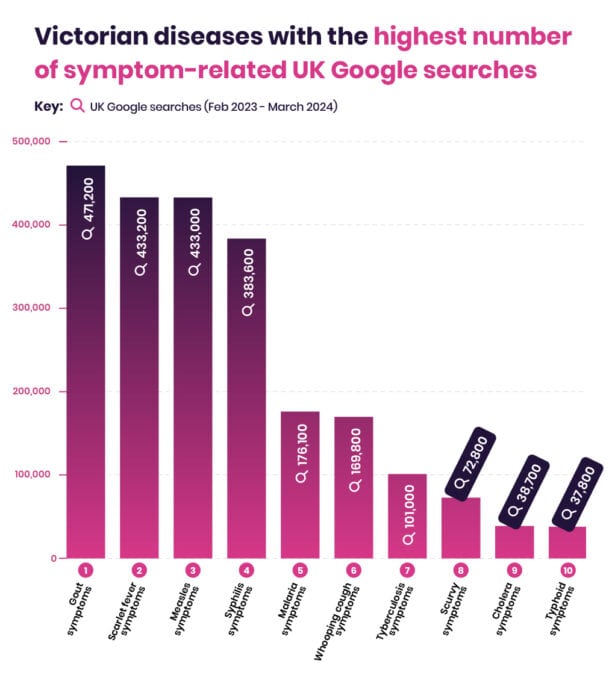
1. Gout symptoms – 471,200 Google searches
Regarding symptoms, the most searched-for Victorian disease is gout, with 471,200 Google searches in the last year. The most common symptoms of gout include inflammation of the joints, lingering discomfort, and joint pain. Gout symptoms are the result of a build-up in urate crystals, and your likelihood of developing gout will increase with age or if you’re overweight.
2. Scarlet fever – 433,200 Google searches
With 433,200 Google searches in the last year, scarlet fever appears next on our list. While anyone is at risk of contracting scarlet fever, it mainly affects children. With cases tending to peak in March and April, you should look for flu-like symptoms followed by a rash and white coating on the tongue.
3. Measles – 433,000 Google searches
The symptoms most commonly associated with measles are a red-brown rash. Still, other signs that you may have contracted this infection include a loss of appetite, aches and pains, and watery/ swollen eyes. A combination of unpleasant symptoms and the fact that it is highly contagious makes it unsurprising that ‘measles symptoms’ have amassed 433,000 Google searches in the last twelve months.
With an 820% increase in Google searches, UK residents are enquiring more about whooping cough symptoms than any other Victorian disease
It has been revealed that some Victorian diseases are returning, so residents are becoming more interested in signs and symptoms. To find out which diseases the UK are most curious about, we have looked at the year-on-year increase in Google searches.
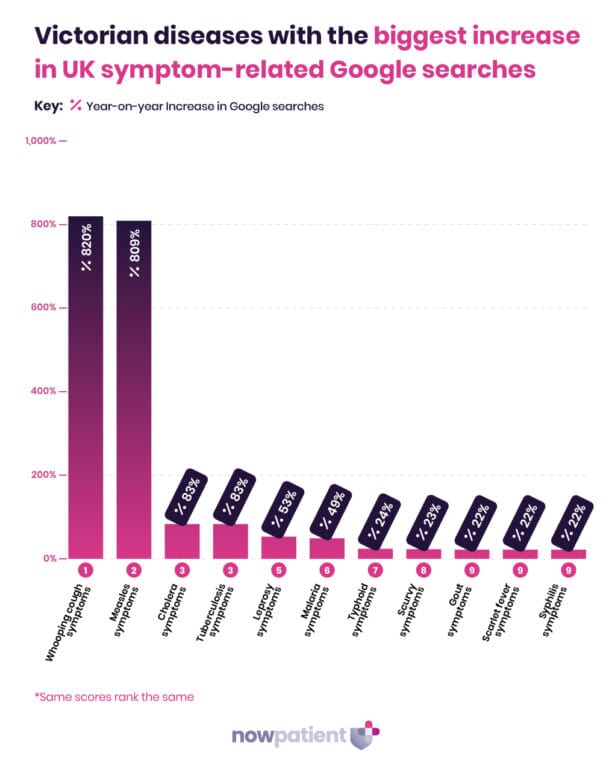
1. Whooping cough symptoms – 820% increase
UK Google searches for whooping cough symptoms have increased by a whopping 820% in the last year, more than any other Victorian disease on our list. Coughing symptoms have increased due to COVID-19, but whooping cough can be differentiated by its ‘whoop’ or gasping sound between coughs.
2. Measles symptoms – 809% increase
There have been numerous outbreaks of measles cases across the UK in recent times, and it appears that this is taking its toll on the residents here, as there has been an 809% increase in Google searches for measles symptoms.
3. Cholera, tuberculosis – 83% increase
Bacteria cause both cholera and tuberculosis, but that isn’t where the similarities end, as UK Google searches for both of these Victorian diseases have increased by 83%, and this is the joint third-highest change on our list.
Methodology
A Freedom of Information (FOI) request was used to find the number of reported cases for each disease/illness. The seeding list was made up of the top 100 NHS trusts based on catchment population. Any entries with fewer than 10 cases were removed from our rankings.
We used Google Ads Keyword Planner to find the total number of Google searches for the term ‘disease + symptoms’ and ‘disease + vaccine’ between February 2023- March 2024.
Medical Disclaimer
NowPatient has taken all reasonable steps to ensure that all material is factually accurate, complete, and current. However, the knowledge and experience of a qualified healthcare professional should always be sought after instead of using the information on this page. Before taking any drug, you should always speak to your doctor or another qualified healthcare provider.
The information provided here about medications is subject to change and is not meant to include all uses, precautions, warnings, directions, drug interactions, allergic reactions, or negative effects. The absence of warnings or other information for a particular medication does not imply that the medication or medication combination is appropriate for all patients or for all possible purposes.






